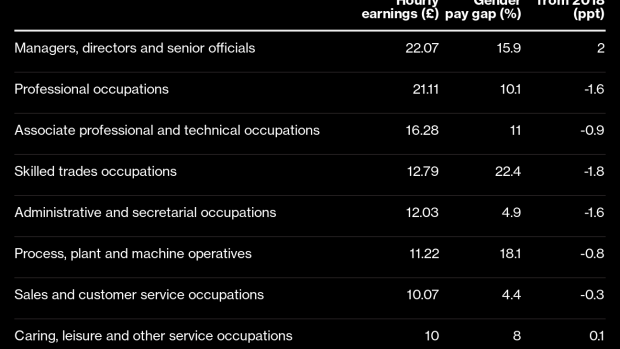Oct 29, 2019
U.K. Gender Pay Gap Narrows But Men Outearn in Most Occupations
, Bloomberg News

(Bloomberg) -- The U.K. gender pay gap shrank to a record low this year, even as men continued to out-earn women in the vast majority of occupations.
Women were paid 17.3% less than male peers on average, compared with 17.8% last year, the Office for National Statistics said Tuesday. The gap is partly explained by the fact that more women are in part-time work, where hourly wages are lower. For full-time workers, the differential was just 8.9%.
The data shines a light on how shifting work patterns and social roles are playing a part in defining people’s incomes. For those under the age of 40, the disparity for full-time employees is now close to zero. But when part-time workers are added, the pay gap for those aged 30-39 stands at over 10%. This coincides with an increase in women working part-time from this age and a move toward having greater caring responsibilities, the ONS said.
Changes in people’s type of occupation also has an impact, the data showed. Full-time gross weekly earnings peaked at age 40-49 for both men and women in April -- the first time in the series that the female pay has not topped out age 30-39.
That may reflect an increase in the proportion of older women working in higher-paid occupations, such as managers, directors and senior officials, although they remain more likely to work in lower-paid roles such as administrative and customer service jobs.
On average men out earn women in about eight of every 10 occupations, based on both full- and part-time employees, and in all of the nine major groups. Carpenters and joiners saw the largest gap, with a difference of 44%, followed by energy plant operatives at 41%. At the other end of the scale, female archivists and curators on average earned 36% more than male workers in the same occupation, and women personal assistants and other secretaries were paid 25% more.
The gender pay gap has come under particular scrutiny in the U.K. following the introduction of mandatory annual public reporting by firms with at least 250 workers which highlighted the dearth of women in the most senior jobs and provoked widespread criticism. The government is now considering the possibility of making reporting by ethnicity a legal requirement too.
To contact the reporter on this story: Lucy Meakin in London at lmeakin1@bloomberg.net
To contact the editors responsible for this story: Paul Gordon at pgordon6@bloomberg.net, Andrew Atkinson, Brian Swint
©2019 Bloomberg L.P.